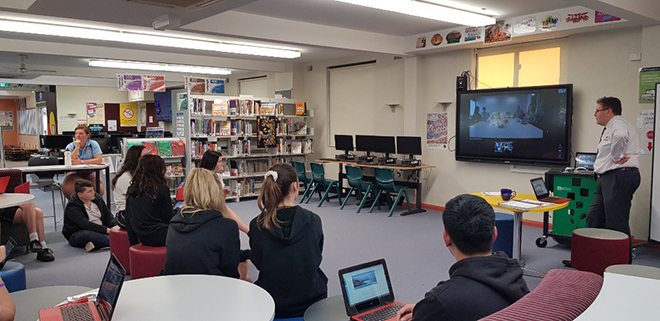Australian students feel unprepared for globalised world

Australian students are a pretty anxious lot and if they’re nervous about what’s happening in their school lives they’re just as concerned about what awaits them post school, indicating that there isn’t enough being done to prepare them for a fast-paced globalised workforce.
According to a recent survey, international experience is shown to be lacking. While more than half of students (59%) say this is key to their future career prospects, one in three (37%) do not feel the curriculum delivers international experience.
The survey, commissioned by education technology company Instructure, indicated that despite students desiring global exposure, 62% have not considered taking part in an international exchange program. Cost was a notable barrier for over two thirds (69%) of parents, with only 29% feeling confident that they could support their child financially on a trip.
The Instructure survey showed online learning to be a strong alternative to travel, with 61% agreeing that cross-border online projects would bring about positive value. Students believe this would empower them with greater awareness of career opportunities available globally (66%), help them stand out from other candidates when applying for jobs (59%), increase their confidence during interviews (56 %) and appeal to companies with a global presence (54%).
Instructure’s pilot cross-border buddy program introduces students to the practicalities of working within an international team. Involving Callaghan College in New South Wales and De La Salle Lipa in the Philippines – the program will run entirely online on Instructure’s Canvas learning management system.
As part of the pilot program, students will collaborate on an assignment that focuses on the topic of “the culture of throwaway plastics”. Working in groups, students must identify the most creative and feasible ways they can persuade people, businesses or the council to reduce the reliance on single-use plastics today.
Troy Martin, VP APAC at Instructure, commented, “By aligning more closely to the world of work, educational institutions can help students better align to the job market. Current models of education are still focused on achievements in basic literacy and numeracy, as opposed to the overall development of the child. Progressive schools that take more responsibility for the cultivation of wider skills will set our future leaders up for success. This covers everything from problem-solving and adaptability, to resilience and intercultural understanding.”
“While the positive impacts of global exposure on young Australians are clear, it is unfortunately not an opportunity that is afforded to all. Children from low socioeconomic households are often the ones missing out from these valuable learning opportunities,” said Martin.
“Technology, when leveraged cleverly, has the capability to bolster equity in education and drive equal opportunities for all.”
The online survey of 1200 Australians was conducted by Atomik Research and respondents were split evenly between a group of 600 students aged 14–18 and 600 parents of 14–18-year-old school-going teenagers.
Other areas of concern were that despite over half of students (55%) agreeing that a career mentor would help them better prepare for work, just 48% have discussed their options with a dedicated advisor. Students are much more likely to use other sources including parents (85%), teachers (59%) and close friends (53%).
Career support and guidance from schools is also an area for concern, with over half (54%) of parents and just under half (45%) of pupils reporting a lack of work experience. Sixty-one % of children want more exposure to different working environments such as offices and work sites, while 73% of parents agree that this would help children make better career choices.